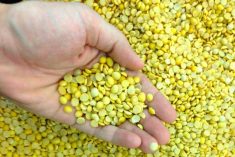Canada’s grain companies are committed to keeping grain moving to domestic and export customers, but how the spread of COVID-19 might affect business is still an unknown, says Wade Sobkowich, executive director of the Western Grain Elevator Association.
“We are are going to do everything in our power to keep grain moving at this time,” he said Monday in an interview, adding that so much depends on how employees are affected by the pandemic.
“If people need to stay home, how do you function, how do you continue to operate?
Read Also

Dryness poised to threaten Saskatchewan crops
Crops in Saskatchewan are developing in opposite directions, the province’s latest crop report said. Growing conditions in the province vary, with some areas receiving enough rain while other locations are experiencing crop stress due to hot, dry conditions.
“There all kinds of things that need to be navigated here, but I don’t have a solid protocol for the grain companies yet and I don’t know that we’ll get to a single one for all the companies. There are probably going to be differences from one company to another as to how they are handling operations. Hopefully there will be a general approach on handling this crisis situation.”
Meanwhile, the Canadian Grain Commission (CGC) will focus on providing statutory services, including inspecting export grain.
“While we might change how some of our programs and services are delivered, we are going to maintain all core activities,” CGC spokesman Remi Gosselin said in an interview Monday.
“As per the Canada Grain Act and regulations, all licensed grain companies will be notified that they will be required to continue their obligations, including, but not limited to licensing and reporting requirements. We will also continue to ensure that farmers are fairly compensated for grain deliveries to licensed grain companies under our Safeguards for Grain Farmers Program.
“We will focus on everything that’s core like grain inspection, collecting and publishing data, payment protection — all those things will continue.”
Why it matters: Canadian grain farmers and Canada’s economy depends on grain exports. It’s uncertain how COVID-19 will affect Canada’s ability to continue exporting. For now, grain is still moving.
CGC staff who can, will work from home, Gosselin said. Many CGC employees were sent home Monday afternoon, he said.
Other employees, such as grain inspectors and laboratory technicians, will continue working in offices and grain terminals.
“It’s more internal service where people can work at home,” he said.
Sobkowich said he was pleased to hear federal government wants to keep trade going. Reporters peppered Prime Minister Trudeau and other cabinet ministers with questions Monday as to why Ottawa was blocking most foreigners from entering Canada, but not Americans where COVID-19 appears to be wider spread.
Health Minister Patty Hajdu said Canada and the United States need access to each other for food and medications, in addition to others forms of commerce critical to both economies.
Deputy Prime Minister Chrystia Freeland said requiring all those entering Canada, including Americans coming from the U.S., to self-isolate for two weeks, should discourage tourists while allowing essential workers to do their work.
“We do think it’s right to recognize the economy and people’s need for sustenance as essential and the grain sector is a big part of that, as is every link in the supply chain between the grain sector and our customers,” Sobkowich said.
So far grain companies haven’t noticed any reduction in rail service for grain and haven’t been told to expect one, he said.
“Each federally regulated employer is trying to figure out how to keep operating on a business as usual basis as much as possible while protecting their employees,” he said.
Although some mills and processors in importing countries have shut down in wake of COVID-19, people still need to eat, he said.
“You don’t need to go buy a new couch, but you do need to go and buy bread so we think overall there is going to be a negative impact on the economy, but we feel agriculture should be able to weather it better than most.”
— Allan Dawson reports for the Manitoba Co-operator from Miami, Man.















